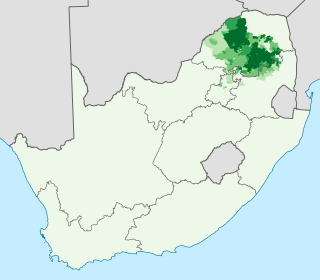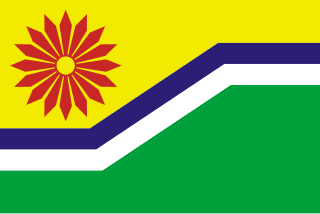
Northern Sotho, also known by the name of its standardised dialect version Sepedi is a Bantu language spoken primarily in South Africa, where it is one of the 11 official languages. According to the 2011 census it was the first language of 4,618,576 people in South Africa, principally in the provinces of Limpopo, Gauteng and Mpumalanga.

The Tswana language or Setswana is spoken in Southern Africa by about five million people. It is a Bantu language belonging to the Niger–Congo language family within the Sotho-Tswana branch of Zone S (S.30), and is closely related to the Northern and Southern Sotho languages, as well as the Kgalagadi language and the Lozi language.

Mpumalanga is a province of South Africa. The name means "east", or literally "the place where the sun rises" in the Swazi, Xhosa, Ndebele and Zulu languages. Mpumalanga lies in eastern South Africa, bordering Swaziland and Mozambique. It constitutes 6.5% of South Africa's land area. It shares borders with the South African provinces of Limpopo to the north, Gauteng to the west, the Free State to the southwest, and KwaZulu-Natal to the south. The capital is Mbombela (Nelspruit).
The Sotho language or Sesotho, is a Southern Bantu language of the Sotho-Tswana (S.30) group, spoken primarily in South Africa, where it is one of the 11 official languages, in Zimbabwe where it is one of 16 official languages and in Lesotho, where it is also the national language.

Limpopo is the northernmost province of South Africa. It is named after the Limpopo River, which forms the province's western and northern borders. The name "Limpopo" has its etymological origin in the Northern Sotho language word diphororo tša meetse, meaning "strong gushing waterfalls". The capital is Polokwane.

The Sotho people, or Basotho, are a Bantu ethnic group of Southern Africa, native to modern Lesotho and South Africa, who speak Sesotho. The Basotho have inhabited that region since around the fifth century and so are closely related to other Bantu peoples of the region.

At least thirty-five languages indigenous to South Africa are spoken in the Republic, eleven of which are official languages of South Africa: Afrikaans, IsiNdebele, Sepedi, SeSotho sa Borwa, SiSwati, XiTsonga, SeTswana, TshiVenḓa, IsiXhosa, IsiZulu, and South African Sign Language. South African English is also an official language, and is the de facto primary language used in parliamentary and state discourse, though all official languages are equal in legal status, and unofficial languages are protected under the Constitution of South Africa, though few are mentioned by any name.

Sebokeng is a township in southern Gauteng, South Africa near the industrial city of Vanderbijlpark.

Fochville is a farming and mining town located in the Gauteng province of South Africa. It is part of the Merafong City Local Municipality, which also includes Kokosi, Carletonville and Khutsong.
The area surrounding Fochville contains Sotho or Tswana ruins. Tlokwe Ruins are the remains of Sotho-Tswana settlements on the hills surrounding Fochville that were inhabited until the 1820s. Boer War hero Danie Theron was killed 5 km north of the town. The town itself was established as an agricultural centre in 1920 and was named after the World War I commander-in-chief of the Allied forces in France, Marshal of France Ferdinand Foch.

Phalaborwa is a town in the Mopani District Municipality, Limpopo province, South Africa. It is located near the confluence of the Ga-Selati River and the Olifants, halfway up along the western border of the Kruger National Park in the Lowveld.

Tzaneen is a large tropical garden town situated in the Mopani District Municipality of the Limpopo province in South Africa. It is situated in a lush, high rainfall fertile region with tropical and subtropical agriculture taking place in a 20,000 km2 region. It is Limpopo's second largest town after Polokwane.

Balobedu (BaLodzwi/Bathobolo) is a southern African tribe and an ethnic group of the Northern Sotho group. They were initially known as BaKwebo .The name "bolobedu" means place of tribute, go loba/lobela. Hence BaLobedu are people who receive tribute from others.They have their own kingdom, the Balobedu Kingdom, within the Limpopo Province of South Africa with a female ruler, the Rain Queen Modjadji.

The Lozi people are an ethnic group primarily of western Zambia, inhabiting the region of Barotseland. They number approximately 575,000 in Zambia out of a population of 10 million. Lozi are also found in Namibia, Angola, Botswana, Mozambique (50,000), the bigger chunk of which is found in the now Zambia, and Zimbabwe (8,000). The Lozi are also known as the Barotsi, Malozi, Silozi, Kololo, Barotose, Rotse, Rozi, Rutse, or Tozvi. The Lozi speak Silozi, a central Bantu language. The lives of the Lozi people seem to revolve around the Zambezi river, which is the second longest river in Africa.

The Sotho-Tswana languages form a subgroup of Southern Bantu. It is sometimes also called "Sotho", but it is more common now to reserve "Sotho" for Sesotho or "Southern Sotho", the group of dialects spoken by the Sotho people (Basotho).
The "Western Sotho" branch or "Tswanaic" branch includes the Tswana language, spoken by the Tswana people (Batswana). In addition, Northern Sotho is a geographical grouping for dialects that are neither part of the Southern nor the Western group.
Black people from South Africa were at times officially called Bantu by the apartheid regime. The term Bantu is derived from the word for "people" common to many of the Bantu languages. The Oxford Dictionary of South African English describes its contemporary usage in a racial context as "obsolescent and offensive" because of its strong association with white minority rule and the apartheid system. However, Bantu is used without pejorative connotations in other parts of Africa.

The Waterberg is a mountainous massif of approximately 654,033 hectare in north Limpopo Province, South Africa.
The average height of the mountain range is 600 m with a few peaks rising up to 2000 m above sea level. Vaalwater town is located just north of the mountain range. The extensive rock formation was shaped by hundreds of millions of years of riverine erosion to yield diverse bluff and butte landform. The ecosystem can be characterised as a dry deciduous forest or Bushveld. Within the Waterberg there are archaeological finds dating to the Stone Age, and nearby are early evolutionary finds related to the origin of humans.

Kololo Senior Secondary School, is a government-aided, mixed, middle and high, day school, in Uganda. Sometimes the school is referred to as Kololo High School.














